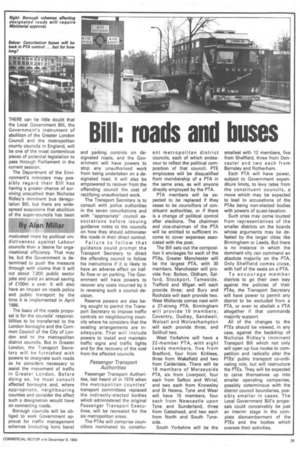Bill: roads and buses
Page 31

If you've noticed an error in this article please click here to report it so we can fix it.
THERE can be little doubt that the Local Government Bill, the Government's instrument of abolition of the Greater London Council and the metropolitan county councils in England, will be one of the most contentious pieces of potential legislation to pass through Parliament in the current session.
The Department of the Environment's ministers may possibly regard their Bill has having a greater chance of surviving unscathed than Nicholas Ridley's imminent bus deregulation Bill, but there are widespread suspicions that abolition of the super-councils has been motivated more by political vindictiveness against Labour councils than a desire for organisational efficiency. That may be, but the Government is determined to push the measure through with claims that it will cut about 7,000 public sector jobs and yield an annual saving of £100m a year. It will also have an impact on roads policy and public transport by the time it is implemented in April 1986.
The basis of the roads proposal is for the councils' responsibilities to be transferred to the London boroughs and the Common Council of the City of London and to the metropolitan district councils. But in Greater London, the Transport Secretary will be furnished with powers to designate such roads as he considers necessary to assist the movement of traffic in Greater London. Before doing so, he must consult affected boroughs and, where appropriate, neighbouring counties and consider the effect such a designation would have on connecting roads.
Borough councils will be obliged to seek Government approval for traffic management schemes (including lorry bans)
and parking controls on designated roads, and the Government will have powers to stop any unauthorised work from being undertaken on a designated road. It will also be empowered to recover from the offending council the cost of rectifying unauthorised work.
The Transport Secretary is to consult with police authorities in the seven conurbations and with "appropriate" council associations before issuing guidance notes to the councils on how they should administer the roads in their direct control.
Failure to follow that guidance could prompt the Transport Secretary to direct the offending council to follow his instructions if it is likely to have an adverse effect on traffic flow or on parking. The Government will have powers to recover any costs incurred by it in reversing such a council decision.
Reserve powers are also being sought to permit the Transport Secretary to impose traffic controls on neighbouring councils where he considers that the existing arrangements are inadequate. That will include powers to install and maintain traffic signs and traffic lights and for the recovery of the cost from the affected councils.
Passenger Transport Authorities Passenger Transport Authorities, last heard of in 1974 when the metropolitan counties' transport committees replaced the indirectly-elected bodies which administered the original Passenger Transport Executives, will be recreated for the six metropolitan areas.
The PTAs will comprise councillors nominated by constitu ent metropolitan district councils, each of which endeavour to reflect the political composition of that council. PTE employees will be disqualified from membership of a PTA in the same area, as will anyone directly employed by the PTA.
PTA members will be expected to be replaced if they cease to be councillors of constituent authorities, or if there is a change of political control after elections. The chairman and vice-chairman of the PTA will be entitled to sufficient income to cover expenses associated with the post.
The Bill sets out the composition it envisages for each of the PTAs. Greater Manchester will be the largest PTA, with 30 members. Manchester will provide five; Bolton, Oldham, Salford, Stockport, Tameside, Trafford and Wigan will each provide three; and Bury and Rochdale will each provide two. West Midlands comes next with a 27-strong PTA. Birmingham will provide 10 members; Coventry, Dudley, Sandwell, Walsall and Wolverhampton will each provide three; and Solihull two.
West Yorkshire will have a 22-member PTA, with eight Leeds members, five from Bradford, four from Kirklees, three from Wakefield and two from Calderdale. There will be 18 members of Merseyside PTA, six from Liverpool, four each from Sefton and Wirral, and two each from Knowsley and St Helens. Tyne and Wear will have 15 members, four each from Newcastle upon Tyne and Sunderland, three from Gateshead, and two each from North and South Tyneside.
South Yorkshire will be the smallest with 12 members, five from Sheffield, three from Doncaster and two each from Barnsley and Rotherham.
Each PTA will have power, subject to Government expenditure limits, to levy rates from the constituent councils, a move which may be expected to lead to accusations of the PTAs being non-elected bodies with powers of quasi-taxation.
Such cries may come loudest from representatives of the smaller districts on the boards whose arguments may be defeated by the larger cities like Birmingham or Leeds. But there is no instance in which the dominant city can command an absolute majority on the PTA. Only Sheffield comes close, with half of the seats on a PTA.
To encourage member districts to go their own way against the policies of their PTAs, the Transport Secretary will have power to permit any district to be excluded from a PTA, or even to abolish a PTA altogether if that commands majority support.
All of the changes to the PTEs should be viewed, in any case, against the backdrop of Nicholas Ridley's imminent Transport Bill which not only will open up bus routes to competition and radically alter the PTEs' public transport co-ordinating role, but will restructure the PTEs. They will be expected to carve themselves up into smaller operating companies, possibly coterminous with the district council boundaries, possibly smaller in cases. The Local Government Bill's proposals could conceivably be just an interim stage in the complete dismemberment of the PTEs and the bodies which oversee their activities.




























































































